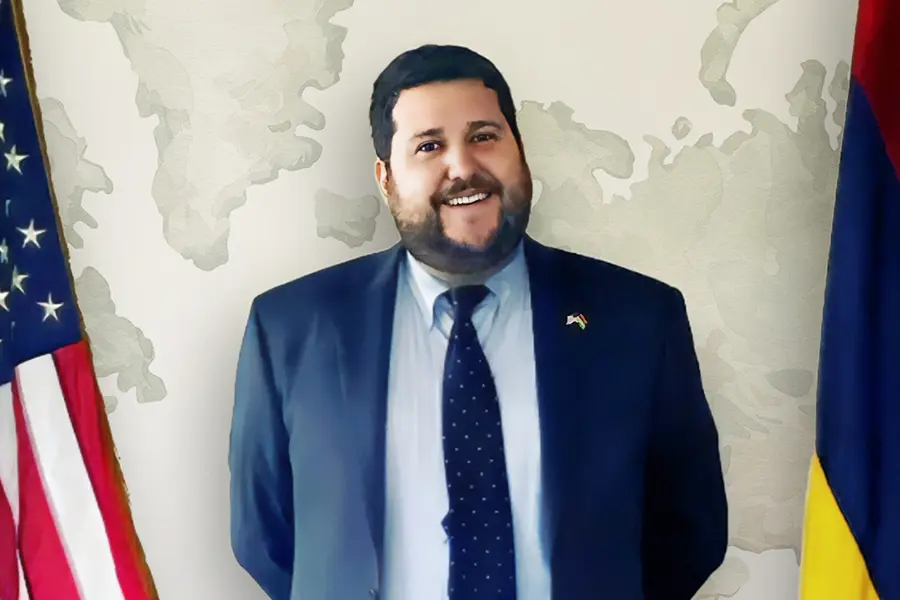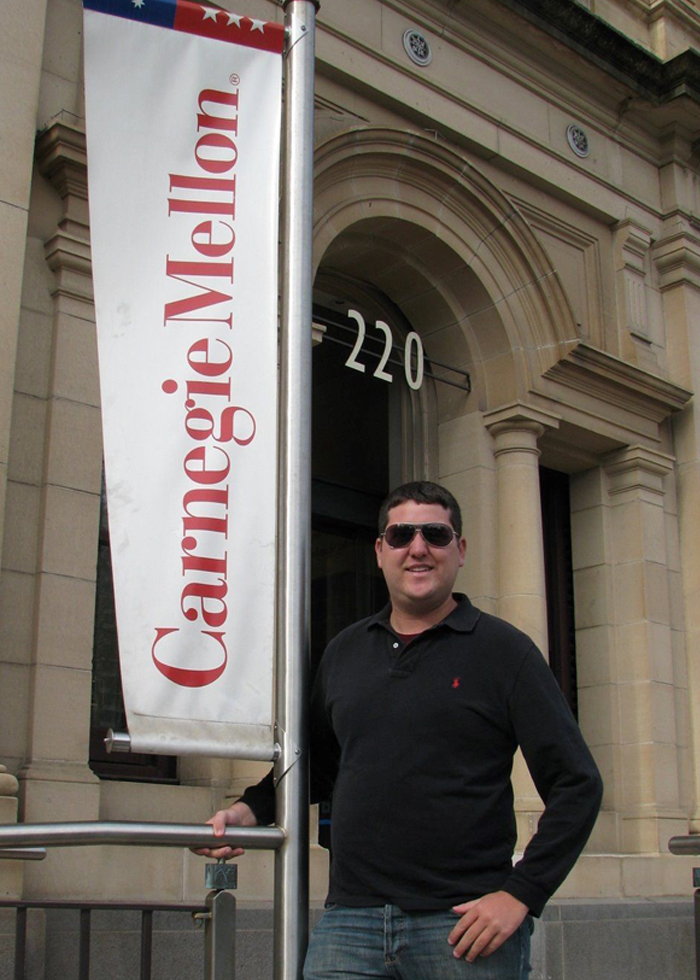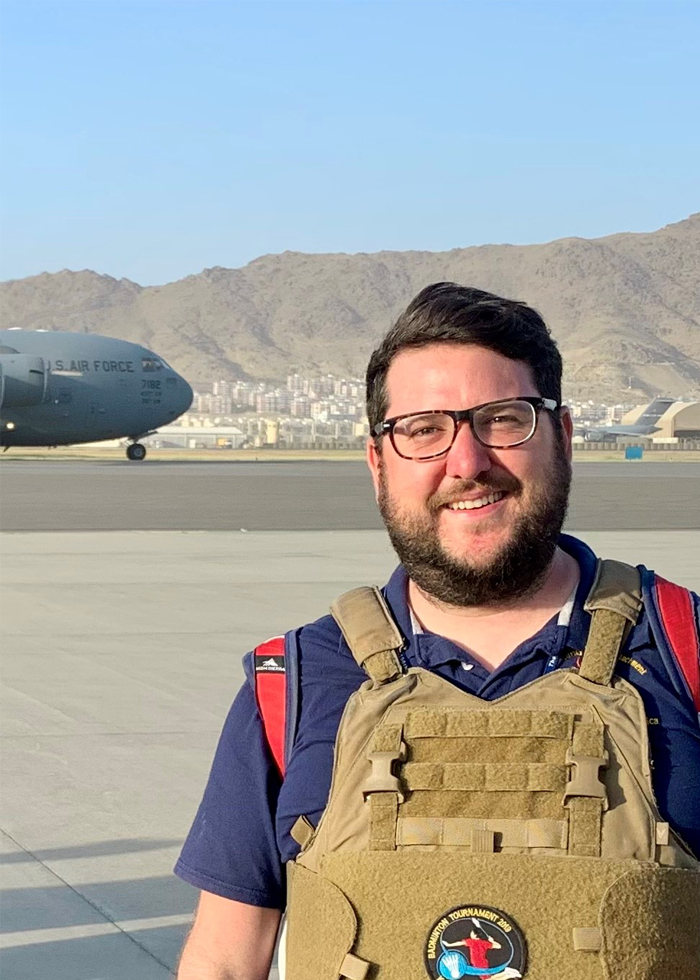
The World Traveler
CMU alumnus Alan Eaton brings a fresh perspective to international affairs
By Kelly Rembold
Carnegie Mellon University alumnus Alan Eaton caught the travel bug at a young age.
His Nicaraguan grandmother was a diplomat to the U.S., and his father worked for the U.S. Agency for International Development.
“I was always around international affairs growing up,” Alan says. “We would have summers visiting dad in southern Africa or going back to Nicaragua to mom's family. It seemed ordinary to me. From a young age, I knew there's a world out there, and I wanted to go explore it.”
Alan followed in his family’s footsteps and built a career in international affairs.
He has worked for the U.S. Department of State since 2015 in consular affairs and the foreign service. Currently, he is a general services officer at the U.S. Consulate General in Porto Alegre, Brazil.
It’s a fulfilling career that’s allowed him to travel, explore and experience things he never expected.
“I’ve been around the world,” Alan says. “I’ve left an assignment early. I've been in a country and gotten kicked out of it. I’ve had to learn a couple languages like Portuguese and Chinese and French. I've been in places for a hurricane. I've been a part of evacuations. My career, in a nutshell, has been absolutely nothing I ever thought it would be like, a very unlikely and unexpected career.”
“I remember being an undergrad and thinking of myself as a failure. But I think learning how to fail and learning that failure is a natural part of the process is a wonderful lesson. You need to have perseverance and pick yourself up, and sometimes, you have to go in completely different directions.”
Fighting Through Failure
Alan’s experience at Carnegie Mellon also was unexpected.
He wanted to become an engineer, but he found the classes to be very difficult.
“I couldn't just glide into a career as an engineer,” Alan says. “It didn't matter that I wanted it and that I worked really hard. I couldn't do calculus. I failed calculus twice. The lesson wasn't that I should work harder at calculus, but that I should do something else.”
On a whim, he enrolled in an international travel writing class.
“I found it to be much easier because I liked the topic,” he says. “That was another lesson — work on something that you like. Do something that you enjoy, and hopefully the classes will be easier because you're interested.”
After taking the writing class, Alan decided to change his major. He went on to receive a bachelor’s degree in ethics, history and public policy from Dietrich College of Humanities and Social Sciences in 2008 and a master’s degree in public policy and management from Heinz College of Information Systems and Public Policy in 2009.
“I remember being an undergrad and thinking of myself as a failure,” Alan says. “But I think learning how to fail and learning that failure is a natural part of the process is a wonderful lesson. You need to have perseverance and pick yourself up, and sometimes, you have to go in completely different directions.”
“There's a whole national security apparatus working behind the scenes. The conduct of diplomacy is typically very quiet and under-appreciated. Witnessing all of these great diplomats working and people coming together for a greater goal was really inspiring.”
Diplomacy in Action
In 2020, Alan was stationed as a consular officer in Chengdu, China, when the U.S. government issued an evacuation order in response to COVID-19.
The State Department asked for volunteers from Chengdu to join the evacuation mission in Wuhan, where more than 800 Americans were waiting to leave the country. Alan and his husband, who was also stationed in Chengdu, both agreed to participate. As consular officers, they were tasked with helping their fellow Americans get to the airport, navigate through immigrations and safely board the plane.
Since then, Alan has volunteered for two more evacuations: Kabul, Afghanistan, in 2021 and Port Sudan, Sudan, in 2023.
“Having been involved with one evacuation, I felt comfortable volunteering for more,” he says. “It sparked my interest.”
During each evacuation, he was inspired by the hard work of those around him.
“There's a whole national security apparatus working behind the scenes,” he says. “The conduct of diplomacy is typically very quiet and under-appreciated. Witnessing all of these great diplomats working and people coming together for a greater goal was really inspiring.”
He says he is open to volunteering for another evacuation in the future, but only if he feels ready.
“If the call comes through, you have to be really comfortable with also saying no,” he says. “There’s a good saying that if you run into the fire too many times, you're eventually going to get burned. I think that's an important thing to acknowledge. This is dangerous and serious stuff, so if you're not 100% in, don't do it.”
“Being a compassionate bureaucrat sounds like an oxymoron. But what you learn as you do all of these different jobs is that the world is just shades of gray. There’s so much context for almost every decision. You have to be more deliberative and have compassion for the situation.”
Balanced Bureaucracy
As a general services officer, Alan manages physical resources, logistical functions, acquisition and supply chain operations, and other services to support the mission of the consulate and U.S. embassies abroad.
That could mean finding housing for a family in need, planning transportation and hotel stays for ambassadors, assessing government buildings for flood mitigation, purchasing supplies for the consulate, organizing motor pools and much more.
“There's no such thing as a normal day-to-day in my role,” he says.
Over the years, he’s learned to find balance in his role as a bureaucrat. He approaches each task with an open mind and a strong sense of compassion for the people he’s working alongside.
“Being a compassionate bureaucrat sounds like an oxymoron,” Alan says. “But what you learn as you do all of these different jobs is that the world is just shades of gray. There’s so much context for almost every decision. You have to be more deliberative and have compassion for the situation.”

 Alan in Kabul, Afghanistan, in 2021.
Alan in Kabul, Afghanistan, in 2021.